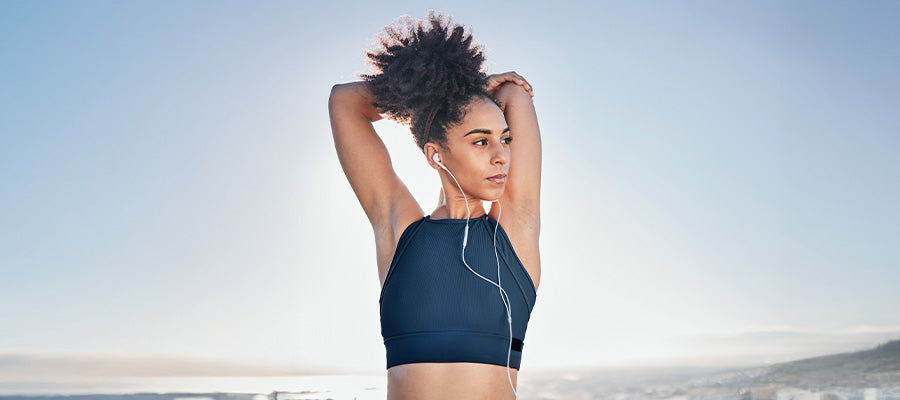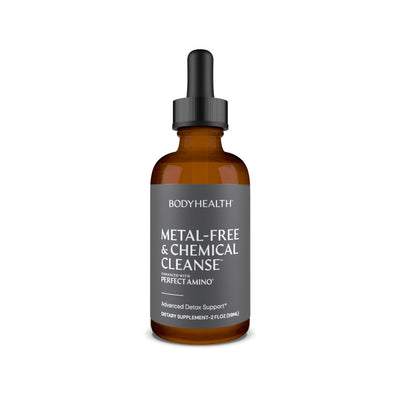Are Collagen Powders Based On A Myth?
September 11, 2025 7 min read

Did you know collagen powders don’t give us as much collagen as we think?
They don’t. Not nearly as much.
And they don’t give us any of the other proteins needed for softer, firmer, more youthful skin.
In fact, collagen often gets credit for qualities that other proteins bring.
If we want more elastic skin that allows skin to stretch out and then come back without creating wrinkles, that’s elastin, not collagen.
If we want softer, smoother skin (not to mention thicker, fuller hair and stronger nails) we need keratin.
But we don’t get these from collagen powders.
This is because, as with any protein (and collagen is just a type of protein), our body doesn’t use the collagen we consume in the form it comes in — it uses the amino acids that it’s made of.
And if they aren’t the right amino acids or the right amounts? It can’t use them.
So let’s dive in and see what’s happening here.
Let’s look at not only what does and doesn’t produce collagen (and how much), but let’s also look at the other proteins that provide qualities which are often associated with collagen, but which, in actual fact, are not from collagen.
What produces those? (Hint: it’s not collagen powder.)
And finally, let’s see what actually gets us the softest, healthiest and most youthful skin.
Ready? Here we go.
WE DON’T NEED COLLAGEN, WE NEED AMINO ACIDS
Before we dive in, we need to understand what we’re looking at.
Collagen is a protein. And like any protein we consume, our body doesn’t use it "as is."
Muscles aren’t made of whey powder and our skin isn’t made of fish scales and eggshell membranes (common ingredients in collagen powders).
Instead, when we consume any protein or collagen, our body breaks it down into the amino acids it’s made of.
Then it uses these amino acids to make new proteins and collagens in the forms the human body does need.
But it needs exact amino acids and it needs them in exact amounts. If some are missing, no protein or collagen can be made. If there are extras of some, above the amounts needed, they can’t be used and are converted to sugar or body fat — calories.
So when we look at collagen powders and what they do or don’t do for our skin, what we’re actually looking at is:
What amino acids are present in collagen powders.
What amino acids are necessary to build new collagen in the human body (and do collagen powders actually contain these).
And what other proteins are needed beyond collagen for soft, smooth and healthy skin and what are amino acids are needed for those.
Let’s dive in.
HOW COLLAGEN PRODUCTION ACTUALLY OCCURS IN THE BODY
If we want to know how much of our collagen powder is actually going toward collagen production in our body, then we need to look at the amino acid structure of both what is in the collagen powder, and what our body needs to make new collagen.
The key amino acids necessary to make collagen are: glycine, proline, hydroyproline, lysine, alanine and arginine.
And approximately 60% to 70% of collagen powder is these amino acids. So that’s good.
But, to make collagen we don’t just need these amino acids, we need them in the correct ratios to each other.
So how do they stack up? Pretty good, actually. While they aren’t in the exact ratios needed, they are pretty close.
Next we need to look at how much of these amino acids the can be used to make collagen will actually be used for other purposes in the body: DNA structure, neurotransmitters, enzymes, etc.
well, that removes some, but we're still doing pretty good.
We're down to about 35%-45% of the collagen powder we take, if fully digested, should be used for collagen production in the body.
That’s pretty good. and we see why so many people take it.
But there's something missing, or not being thought with. Actually a few somethings.
You see, there are the amino acids that collagen is made out of (above). These are the actual ingredients of collagen which, when assembled together, result in collagen.
But then there are the fibroblasts that are needed.
These are fibroblasts needed in order to use the above amino acids to make the collagen. If we don’t have these, then it doesn’t matter how much glycine, proline, hydroyproline, lysine, alanine or arginine we have as… there is nothing there to put them together into collagen.
So what’s needed to make these fibroblasts?
The essential amino acids — each one. (Along with vitamin c, copper and iron, without which no collagen production occurs.)
But collagen powder is very low in most of the essential amino acids. And it contains none of the essential amino acid tryptophan unless artificially added by a company.
So we may have enough of the amino acids collagen is made of, but we don’t have the amino acids necessary to actually put them together.
And without getting these essential amino acids from another source, we can’t make any collagen.
But there’s more. Because much of the qualities that collagen gets credit for bringing to the skin… aren’t from collagen.
THE ACTUAL INGREDIENTS OF SOFT, HEALTHY, YOUTHFUL SKIN
Our skin is made of layers. On the outside we have a protective layer known as the epidermis.
This provides a physical barrier to keep out pathogens, chemicals and UVs, helps prevent water loss and provides skin tone/pigment (melanin).
And underneath this we have the dermis. This provides structural strength to the skin, provides elasticity so the skin can stretch and come back to shape without sagging or forming wrinkles. And it holds the hydration and plumpness of the skin.
If we want soft, smooth skin, we’re looking at the epidermis, the outer layer. It controls texture and hydration. This is what is either dry or flaky or soft and supple. while the dermis holds in water for hydration, it's the epidermis that prevents it from evaporating out.
The dermis gives us youthful volume, elasticity and firmness. When this degrades we get thin, wrinkled and saggy skin, even if the epidermis is smooth.
But both are necessary.
Now, if we just take collagen powders, besides the low utilization rate of the amino acids they contain as far as producing collagen, they produce little to none of the other proteins necessary for these two layers of skin.
For soft, smooth, full, elastic, and youthful skin we don’t just need collagen, we need elastin, keratin, fibrillin, fibronectin and laminin.
Collagen is in the dermis only. It provides the framework that gives skin its strength (resistance to stretching and tearing). It also works with elastin (for elasticity) and helps to make skin strong, flexible, and full.
But it’s Elastin that provides elastic recoil — the ability of skin to snap back after stretching without starting to sag or produce stretch marks. This is crucial for skin’s springiness. In fact, elastin provides nearly 1000 times the elasticity of collagen.
Collagen powders do not provide all of the needed amino acids to produce elastin. So none is produced.
Keratin is the main protein in the epidermis (outer layer of skin), as well as in hair and nails. It provides barrier strength and protection as well as softness, smoothness and hydration. If our skin is dry or flaky, we don't need more collagen, we need more keratin.
And collagen powder has almost none of the amino acids needed to produce keratin.
Fibrillin forms the structures that elastin uses in the skin. So without fibrillin, we wouldn’t get elasticity from elastin or collagen.
Collagen powders do not contain all of the needed amino acids to make fibrillin.
Fibronectin is involved in cell adhesion and wound healing. It helps organize the fibers collagen forms. But collagen powders don’t have the amino acids necessary to make this.
And Laminin is part of the membrane that joins the dermis and the epidermis. This is critical for skin cell regeneration.
Collagen powders do not contain the amino acids needed to make fibrillin either.
Do you see where I'm going?
From: “taking collagen powder provides collagen for soft, healthy, youthful skin,” we’ve found that only about 35-45% of the amino acids in collagen powders can actually be used for this.
We also found that in order for those amino acids to be assembled into collagen, other essential amino acids must be present. And collagen has little to none of these.
So without outside proteins sources we actually can't assemble any collagen.
We also found that collagen is just one of many proteins needed for soft, firm youthful skin.
That without these other proteins, and only collagen, we could actually have wrinkly, lined skin that is thin, non-elastic, dry and doesn’t heal well.
Collagen is necessary and collagen powders aren't bad. But the others are needed just as much. And collagen powders do not provide them.
So what do we do?
HOW TO GET THE SOFTEST, SMOOTHEST MOST YOUTHFUL SKIN
If we want to the softest, smoothest, most youthful skin, then we need each of the above proteins.
Which means we need each of the amino acids that make them up.
That’s where PerfectAmino comes in.
It’s pure essential amino acids in the exact ratios needed by the body.
It provides the amino acids and precursors that our body uses to make collagen, elastin, keratin and each of the other necessary proteins.
And it does so with almost no caloric impact.
This is why so many people report smoother, softer, more youthful skin after taking PerfectAmino.
And they also report thicker, fuller hair and stronger nails, which comes from the keratin support PerfectAmino provides.
If you want the most effective skin protein enhancer available, then you need PerfectAmino.
Add in Multi Complete for Vitamin C, Zinc, Copper and Manganese (also necessary for collagen production), and Reds for skin antioxidants, and your skin has exactly what it needs.
Try them today.
You'll be very happy with the results.
Articles by Health Topic
Your Path To Better Health Starts Here!
From in-depth articles on nutritional benefits to updates on new product launches, stay informed and inspired on your journey to optimal health.
*These statements have not been evaluated by the Food and Drug Administration. These products are not intended to diagnose, treat, cure, or prevent any disease.








